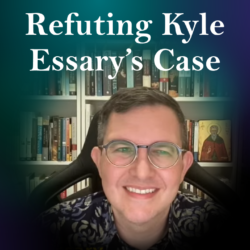In part one, Brandon Duke laid out some of the important groundwork for thinking about how a good and powerful God might have a world capable of experiencing immense amounts of evil and suffering. In our conversation today, we’ll delve further into the idea of soul-making to explain why suffering like death, damage, decay, and deprivation along with the limitation of God’s hiddenness are necessary conditions for a world where authentic moral decisions occur and human development becomes possible.
—— Books——
- God and the Problem of Evil: Five Views by Chad Meister, James Dew Jr.
- Divine Foreknowledge: Four Views by Gregory Boyd, David Hunt, William Craig, Paul Helm
- The Triumph of God over Evil by William Hasker
- Four Views on Divine Providence by Paul Helseth, William Craig, Ron Highfield, Gregory Boyd
- Divine Hiddenness: New Essays by Daniel Howard-Snyder, Paul Moser
—— Links ——
- Leave a voice message via SpeakPipe with questions or comments
- Get in touch with Brandon Duke on his website: TruthBorn
- Check out Duke’s videos at the Unitarian Christian Alliance YouTube Channel
- Watch Duke’s Trinity debate
- Also check out this six part series on various theories of divine foreknowledge, including Calvinism, Arminianism, and Open Theism.
- More episodes and posts about the problem of evil and suffering
- If you’d like to support Restitutio, you can donate here.
- Intro music: Good Vibes by MBB Attribution-ShareAlike 3.0 Unported (CC BY-SA 3.0) Free Download / Stream: Music promoted by Audio Library







Is it just me that is tempted to fast forward to Sean’s post scripts on each episode? Maybe “Restitutio: PostScripts” needs to be a channel.
I’m cracking up (and nodding along) with his description of Job as a theological treatise that is an exemplar of dialogue on difficult issues that doesn’t finish with the last word. To put it bluntly, man, I wish Job had closed the case for us.
Also, I fully agree with Sean’s bold claim that we may be in a unique position in history to answer some of these questions. We can SEE the beginnings of the universe! Case closed on whether it began. We can make a fine tuning argument that simply didn’t exist 100 years ago, take THAT Greek philosophers that say the world was made by an incompetent. We have the manuscripts and time to identify where Augustine made mistakes in his thinking between “On the Free Choice of the Will” and “On the Predestination of the Saints”, take THAT determinists!
Indeed, good philosophy is our responsibility, and isn’t Restitutio a wonderful example of that endeavor.
Thanks for letting me be a part of it.
One more comment in advance of the next episode, hopefully it will be reflected in the discussion in the next episode.
Some people think their job is to never be wrong. I think our job is to always be becoming more right.
Regarding the fall:
As Sean says: “He set up the system.”
God responds to the fall with wisdom and love. He reorients the conditions of the creation to continue to fulfill his objectives in response to the free choices of his children.
That sounds about about right, Brandon!
That formulation is about to be tested in the upcoming episode! Let me know what you think, will be interested to get additional feedback.
I thoroughly enjoyed these two episodes on the problem of suffering; and found them very interesting. I have known for a while that Brandon has studied this subject extensively, and I have even told him that I would like to read or hear a résumé of his studies. And thanks to Restitutio, I have now done so. As usual, Sean, you were very competent in your interviewee’s field of expertise. I was amused by your enquiry as to the cost of the love-and-obedience pill.
I look forward to hearing Jerry Wierwille’s take. But I find these theodicies and examinations of the problems of evil and of suffering, such as this “soul-making” or character-forming solution, often too exclusively focused on humans. Why do animals suffer so much? I am not thinking so much of the horrific cruelty of men towards animals. We could explain that – if maybe not in a satisfactory manner – by the free will of wicked humans, of which animals are the most unfortunate victims. But even in the wild, in their natural habitats, away from perverse humans, animals have a wretched lot. For one animal to survive, another has to be mauled, clawed and bitten to death, or eaten alive. The insect kingdom is also very cruel. We could ascribe this to the Fall – even though animals never sinned – as apparently, animals were all herbivorous before the fall, as thankfully it seems they will also be after the restoration; but it doesn’t seem that they could have simply transitioned from herbivorous to carnivorous, without some new act of creation occurring, giving them sharp claws, lethal incisors and fangs connected to venom sacks.
I have listened a couple of times to podcast 89 of Dale Tuggy’s Trinities: Dr. Trent Dougherty on the Problem of Animal Pain. Whereas Dr. Dougherty’s views that animals will be compensated for their suffering at the resurrection, or as he believes, in heaven, offers some hope; it still doesn’t explain why animals should suffer so horrifically now. Also, I believe that if every animal who has ever suffered were to be resurrected, the earth probably wouldn’t be big enough to contain them all.
I don’t know why so many of the worst things begin with the letter d, like death, decay, deprivation, disease, disaster, dread, destruction, despair, doom, damnation, devil, demon, demolition, disintegration, dysentery and desolation. I hope that David is an exception.
The problem of animal pain is one I struggle with too. The closest answer I’ve come to is that from Michael Murray in his book, Nature Red in Tooth and Claw. Basically he argues that they don’t have the level of self awareness that humans do, to reflect on pain in a first person perspective, “I am in pain”.
As I said, it’s the closest thing I’ve found, and I’m still searching.
The extent of your reading Brandon, is remarkable. Yes, Trent Dougherty mentioned Michael Murray’s book in his interview with Dale. But he didn’t mention the title of it, which is a good one. He refers to this kind of thinking as “neo-Cartesianism,” which is obviously an application specific to the problem of animal pain, and not to the more general philosophical method. I have been aware for several decades of Descartes’ view that animals don’t have souls, and that they therefore don’t feel pain. This was in large part, what opened the door a few decades later, to the slew of horrific vivisections and animal experiments in various science academies like the Académie des Sciences in Paris, and the Royal Society in London. I’m sorry to say, that I find this view that animals don’t feel pain absolutely repugnant. From what you say, it sounds like Murray doesn’t go as far in this vein as Descartes does, though Dougherty seems to me, to suggest that he has pretty similar reasoning. I don’t see how anyone who has known any animal at all, such as someone who has ever had a relatively close relationship with a dog or a cat for example, could possibly entertain this view. And even if one has not had a pet, photos or videos of animals in distress, such as monkeys in laboratories, warthogs being caught alive by crocodiles, or bulls shedding tears in a corrida, clearly indicate that they are in great distress. It also seems obvious to me that animals feel fear, which implies feeling pain. If you’re afraid, there’s got to be something that you’re afraid of.
Yep, I hear ya. I remember first hearing of Murray’s argument in a presentation from William Lane Craig, that then led me to the book.
And I remember being totally unimpressed. “How convenient, they look like they are in pain, they sound like they are in pain, they act like they are in pain, but they aren’t in pain???!!!”.
I still am not sure I’ve overcome that reaction, and it sounds like we share the same intuitions.
It’s why I’m still looking.
If there however is a fundamental difference in the way consciousness works for us, if we have important cognitive capabilities that the other animals simply don’t have, perhaps appearances are deceiving, perhaps we are projecting onto them something inappropriate. I don’t know that I’d argue that strongly, and I’d be very happy to hear alternatives.
Here’s one modified argument from what I’ve said so far: what if there is not feasible way for God to create us without an evolutionary process, and that process includes eons of suffering for the animals before we then experience suffering. Perhaps God is justified in their suffering and ours, because the greater goods cannot otherwise be achieved. Layer on his ability to resurrect (that’s my next big study by the way) animals in worlds with different constraints, providing THEM with a world to come, and maybe the same soul making policy theodicy I make for us applies to them.
I don’t know, it’s still a difficult problem I’ve not focused on.
Brandon, I presume you’ve listened to Dale’s interview with Trent Dougherty on Trinities? He says that he devotes two chapters of his book to refuting Michael Murray. You may be interested in reading them.
Thank you, Brandon. This is a much more satisfactory explanation than I had heard before.
Isn’t it interesting, too, that often our sufferings cause us to seek more? Our experiences often prove that what we originally thought or were taught is not true – and so we pursue answers. I think that must be a part of this “soul-making” of which you spoke – which is a brand new term for me.
Question – do you know of a simple resource (video or audio or concise article) I could share with someone on this topic? I hesitate to share these podcasts with those who are Trinitarians – because I can get not further once the wall goes up.
Thanks for blessing others through your suffering!
Thank you for your encouragement Heather!
Indeed, often it is our failure to possess the truth that causes our suffering, and so we are driven on to continue seeking it. I definitely think truth seeking and soul making are inextricably linked. Very often we learn from mistakes, whether they be falling down physically, or sinning against God’s laws. And providing such an arena for learning, is indeed critical for such soul making, but also entails such suffering.
As to a concise reference resource, I am afraid that I know of few. Nearly everything on this subject is lengthy, contentious, and challenging. If anything the plethora of resources (articles to pull up from Google searches, Christian apologists videos on YouTube, and books by academics) can be overwhelming. It’s why I’ve spent 3+ years in study, and still struggle to even offer my view in less than a 2 hour interview, and that was overly simplified.
Perhaps such an article should be my next effort, something clear, brief, and containing the key ideas I find most helpful. I’ll post back here once I’ve finished such, and I’ll undoubtably also post it on my blog at truthborn.org. I’ve got a sign up form on the site that allows subscribers to be notified when a new blog post comes out, you might check there if you’d like to be notified.
Thank you for the prompt, and the encouragement.
Thanks for getting back to me. I will check out your blog and sign up.
I am presently reading an article, “Early Church Catechesis and New Christian’ Classes in Contemporary Evangelicalism” by Clinton Arnold. Although I cannot agree with all that the early Church Fathers believed, I am impressed by the efforts they made to train up believers. “The ‘Apostolic Tradition’ reflects the practice of instructing them [new believers] for a span of three years: ‘let the catechumens hear the Word for three years.'”
Having been a Christian for most of my life, and yet only nearing close to four years in new and clearer understandings, I believe that the efforts of men and women like you, Sean, and others to first clear up the muddy waters and then faithfully teach and train is foundational to the vitality of the Body of Christ.
The article goes on to say, “Part of the motivation and concern for a lengthy process was rooted in a desire to foster solid spiritual formation and to protect these new believers against sin, heresy, and apostasy. …’The key was conversion, itself a journey ..'” Cyril of Jerusalem explained it as follows, “Let me compare the catechizing to a building. Unless we methodically bind and joint the whole structure together, we shall have leaks and dry rot, and all our previous exertions will be wasted.”
May such efforts be thorough – that our faithfulness will continue unbroken for generations.